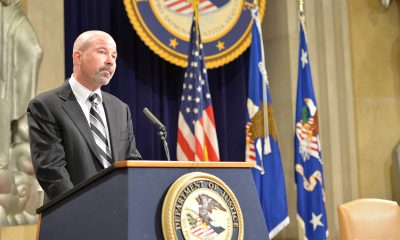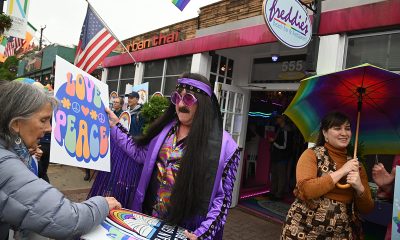Arts & Entertainment
Jasmine Guy’s world today
Actress in town this weekend with Harlem Renaissance tribute show
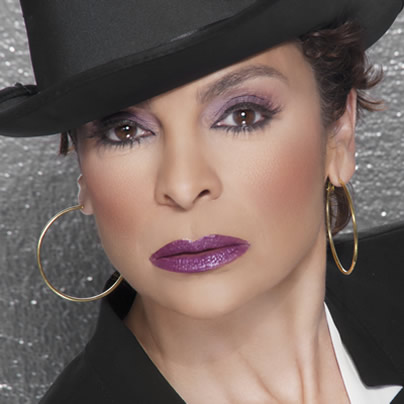
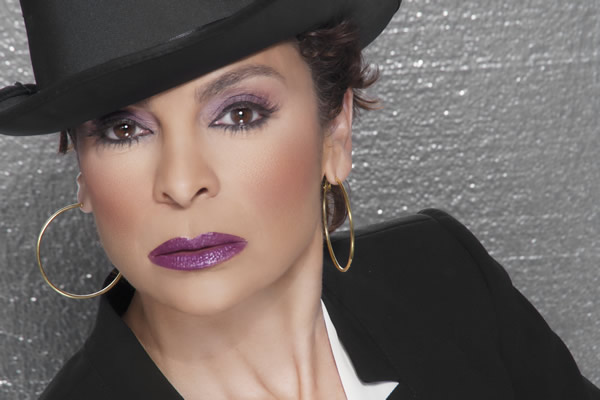
Actress Jasmine Guy says her passion for black culture in the early 20th century has kept her doing ‘Raisin’ Cane’ for five years. (Photo by Calvin Evans)
‘Raisin’ Cane: A Harlem Renaissance Odyssey’
Starring Jasmine Guy and the Avery Sharpe Trio
Saturday, 8 p.m.
Publick Playhouse
5445 Landover Rd.
Cheverly, MD
$55 VIP (includes pre-show reception)
$40 general
301-277-1710
Actress/singer Jasmine Guy will be in the D.C. area this weekend for a one-night-only performance of “Raisin’ Cane: a Harlem Renaissance Odyssey.”
We caught up with her by phone from her home in Atlanta where she answered questions about the show, gay rights, her work on the hit ’87-‘93 sitcom “A Different World” (she played spoiled Whitley for the show’s entire six-season run) and more. Her comments have been slightly edited for length.
WASHINGTON BLADE: Tell us about “Raisin’ Cane.”
JASMINE GUY: I’ve been doing the show over the past five years in various places all over the country. It grows and changes and morphs every time we do it. I do it with three other musicians — a jazz violinist, a percussionist and our composer, Avery Sharpe and we cover the decade between 1919 and 1929 of the Harlem Renaissance, right after World War I but just before the Great Depression when there was a lot of money flowing into Harlem and a lot of artists were flourishing. Painters, poets, writers, philosophers, so it was a pretty rich time in our American history. A lot of what has come down to us as Americans has come from that period as far as ways of thinking and ways of articulating our needs.
BLADE: Are you playing a specific character?
GUY: I’m like a teacher taking you through this journey. Along the way, whatever lesson needs to be taught, that’s what I do. I either reenact a scene or become another character or I dance or sing or tell a story or recite a poem — there’s a lot of all of that involved in the show.
BLADE: How did you come to the work?
GUY: Avery Sharpe and I have been friends for over 30 years and when he brought the piece to me, it started as a reading and an experimental piece to see where the interest was with people and over the last five years, it’s just continued to grow and grow. I stayed involved because of my passion for that decade and what was happening politically and historically in that time as well as artistically. It was such a fun and exciting time where jazz was birthed and we had poets like Langston Hughes and Zora Neale Hurston and painters like Aaron Douglas and philosophers like W.E.B. DuBois and Booker T. Washington and Marcus Garvey who were claiming freedom in their own way.
BLADE: African-American themes are recurring in your body of work. To what degree have you sought them out versus had them come to you?
GUY: Sometimes they intertwine. There are the roles that we pick and the roles we kind of cross paths with and we don’t really know why. There have been certain projects where I feel like I’m part of telling the truth, whether it’s “A Different World” or “Queen” (“The Story of an American Family”), or “Stompin’ at the Savoy” or “Dead Like Me,” there seems to be a certain truth to the quality of the work we’re doing at the time and I think that truth is what draws me in. I love that we tell stories that haven’t been told yet and that I’m able sometimes to get an audience to think as well as to laugh. I’m not sure which is more important, but I like that I can do both.
BLADE: Some have said gay activists who draw parallels to the Civil Rights movement are overreaching. Is that a valid line of reasoning in your opinion?
GUY: I have had friends over the years who have resented the comparison. … I think what we really all want is to be treated equally and have the right to make our own choices in our lives and in that respect, both gay rights and African-American rights have been stifled in this country and we’ve had to fight for those rights. We are still fighting in certain ways for those rights. … For some … the fight has shifted. I mean, we’re able to vote legally, we’re able to integrate, but there are still very specific things that are disproportionate in this country. There’s a huge class difference and whether you’re black or gay, there are still things we need to speak up for because in principle, it’s all the same principle. We are really all fighting for the same thing.
BLADE: With all your work in the entertainment industry, you must have worked with a lot of gays over the years. True?
GUY: Oh absolutely. I mean, you know, my world is full of gay people. I’ve been so entrenched in the gay community that it has never been a second thought to me. We are all family and because of that, I’m even more sensitive to what my gay friends go through. I’m 51, so I lived through AIDS and although I was very young when AIDS came to be, that’s when I first realized how segregated the gay community was for the rest of the world. Sometimes you forget that the world is not accepting and it takes something bad like the AIDS epidemic for you to realize. That’s when I started to realize my gay friends were heroes in their own right for having the courage to live the lives they know they want and the need and fight for the right to do that. And I don’t use that word fighting lightly, you know. I have friends who have fought all their lives, physically and emotionally. Some who have not had the support of their families. I don’t think people really understood what it means to be gay until very recently, in the last decade or so, whereas for me, it was just always a part of what I knew and understood.
BLADE: You’ve done so much work on stage, film and TV over many years and stage work, of course, by its nature is very ephemeral and fleeting. You can be on a hit show like “A Different World” that was seen by 20 million people each week, yet in some ways, it’s a small part of your overall body of work. Has that ever been a source of frustration for you?
GUY: That was frustrating for me at the beginning. I started as a dancer with the Alvin Ailey Company and yeah, I felt that, you know, my best work is probably the work that most people haven’t seen. I did have to come to terms with that because I mean, just the sheer degree of difficulty of being a dancer and being a gypsy as I was for eight years before I got “A Different World,” compared to the relative ease of being on a hit TV show, I used to think, “OK, I’ve got to make sure everybody knows that these other things are so much more worthy.” I felt it was my personal cause to let people know that, yes, I’ve worked with Judith Jamison and I know Debbie Allen and worked with Courtney Vance in “Six Degrees of Separation” and so and so. … I’ve really been surrounded by greatness and amazing talent and I’ve been in the wings of so many performances where I saw that happen before my eyes and that’s not something we’ve always been so great at being able to recreate on television. … But things are so different now and we have access to everything in a way we did not have before. That was a real turning point for me to realize that. We can say things now we could never say before on a major, major scale and we can create our own audience. It’s always interesting to me when people come up to me, what they come up to me for. I guess I’ve had enough people say, “Oh, I saw you in ‘Chicago,’” or “I remember you years ago on the Academy Awards — I didn’t know you could dance.” They might have seen that thing I thought nobody was watching. Of course, that’s nothing compared to the 20 or 30 million people that watched “A Different World” every week, but I am also proud and happy to have been part of that, too. But these other little sidebars, enough people have commented that I’ve been able to say, “OK, there’s somebody out there who’s seeing the other stuff too.”
BLADE: That said, do you have a favorite episode of “A Different World”?
GUY: My memory of certain episodes is kind of from the inside out. Like I remember doing things more than the effect it may have had on other people. I wrote a couple, so of course I remember those and, hmmm, let me see. Oh my God — we had so many great shows. I tended to like the shows where we had guest stars.
BLADE: Like Gladys Knight — I remember her appearance so vividly.
GUY: Yes, that was huge. I was so excited to get to be a Pip and sing with her and meet her. On the set at one time we had both “Superfly” and “Shaft” because Ron O’Neal played my dad and Richard Roundtree played Charnele’s (Brown, who played Kim) dad. We had Diahann Carroll, Patti LaBelle, Jesse Jackson. We had the cast of “Sarafina!” on when we did a show about apartheid. Those were the most memorable moments for me. These people would come through and we would just sweep ‘em up because by that time we had a rhythm. We just kind of knew we could be funny no matter what we talked about and that was a good place to be for the show.
BLADE: So many iconic sitcom characters don’t work as lead characters. Garry Marshall said they knew better than to try to have Fonzie carry his own show. Other times they tried and it didn’t work — like Flo from “Alice.” I know “A Different World” was still an ensemble cast at heart, yet it seemed like the show really jelled in the second season after Lisa Bonet left and your character Whitley was much more in the lead spot. Why do you think it worked so well when traditionally that type of thing hasn’t worked?
GUY: Well, we certainly weren’t sure it was going to work. That first season, I always felt we weren’t gonna make it. I had never been on a show before but it just seemed kind of dysfunctional and I didn’t feel we were putting out our best product. I was kind of thinking, “OK, that isn’t gonna work, but at least I paid off my American Express.” Then as the show grew and we were picked up year after year and with the legacy of “The Cosby Show” behind us, I started to realize we were part of a wave, a real era of change on American television. I didn’t understand at the time we were at the end of that wave. I didn’t think it would just snap back and never be seen on TV again, you know with the number of female writers and the diversity we had on our show. …. I just thought there would be a whole lot more “Different Worlds” after our show and there really weren’t. … At the time, I think I was able to make that transition because I just did what was given to me to do. I just did what was in front of me. I never thought at the time, “Oh, if Lisa leaves the show, we can still continue if Dwayne and Whitley get together” — there wasn’t any of that. That was all Bill Cosby, Debbie Allen, NBC, the writers — you know this whole team of people that revamped that show and by the second season they had totally revamped it in a way that had more of a realistic HBCU (historically black colleges and universities) feel and they just capitalized on the actors that were already with the show. They brought in Cree Summer and Charnele Brown, but there was an absolute choice made to keep that show going based on what had and hadn’t worked that first season.
BLADE: That opening credit sequence from the second season on was really incredible the way it looks like it was shot in one continuous take with the camera moving from room to room left to right. It couldn’t really have been one take, though, right?
GUY: Oh no, it took like all day long. It was green screened and there were double images — like two of me in the same shot. It was before a lot of computer graphics and things we’re able to do now so yeah. That was the brainchild of Debbie Allen and it was an all-day-long thing — like 12 or 14 hours to do that.
BLADE: Thanks for your time and good luck in the show.
GUY: Thank you.
Books
‘Pronoun Trouble’ reminds us that punctuation matters
‘They’ has been a shape-shifter for more than 700 years

‘Pronoun Trouble’
By John McWhorter
c.2025, Avery
$28/240 pages
Punctuation matters.
It’s tempting to skip a period at the end of a sentence Tempting to overuse exclamation points!!! very tempting to MeSs with capital letters. Dont use apostrophes. Ask a question and ignore the proper punctuation commas or question marks because seriously who cares. So guess what? Someone does, punctuation really matters, and as you’ll see in “Pronoun Trouble” by John McWhorter, so do other parts of our language.

Conversation is an odd thing. It’s spontaneous, it ebbs and flows, and it’s often inferred. Take, for instance, if you talk about him. Chances are, everyone in the conversation knows who him is. Or he. That guy there.
That’s the handy part about pronouns. Says McWhorter, pronouns “function as shorthand” for whomever we’re discussing or referring to. They’re “part of our hardwiring,” they’re found in all languages, and they’ve been around for centuries.
And, yes, pronouns are fluid.
For example, there’s the first-person pronoun, I as in me and there we go again. The singular I solely affects what comes afterward. You say “he-she IS,” and “they-you ARE” but I am. From “Black English,” I has also morphed into the perfectly acceptable Ima, shorthand for “I am going to.” Mind blown.
If you love Shakespeare, you may’ve noticed that he uses both thou and you in his plays. The former was once left to commoners and lower classes, while the latter was for people of high status or less formal situations. From you, we get y’all, yeet, ya, you-uns, and yinz. We also get “you guys,” which may have nothing to do with guys.
We and us are warmer in tone because of the inclusion implied. She is often casually used to imply cars, boats, and – warmly or not – gay men, in certain settings. It “lacks personhood,” and to use it in reference to a human is “barbarity.”
And yes, though it can sometimes be confusing to modern speakers, the singular word “they” has been a “shape-shifter” for more than 700 years.
Your high school English teacher would be proud of you, if you pick up “Pronoun Trouble.” Sadly, though, you might need her again to make sense of big parts of this book: What you’ll find here is a delightful romp through language, but it’s also very erudite.
Author John McWhorter invites readers along to conjugate verbs, and doing so will take you back to ancient literature, on a fascinating journey that’s perfect for word nerds and anyone who loves language. You’ll likely find a bit of controversy here or there on various entries, but you’ll also find humor and pop culture, an explanation for why zie never took off, and assurance that the whole flap over strictly-gendered pronouns is nothing but overblown protestation. Readers who have opinions will like that.
Still, if you just want the pronoun you want, a little between-the-lines looking is necessary here, so beware. “Pronoun Trouble” is perfect for linguists, writers, and those who love to play with words but for most readers, it’s a different kind of book, period.
The Blade may receive commissions from qualifying purchases made via this post.

Friday, April 18
“Center Aging Friday Tea Time” will be at 2 p.m. on Zoom. This is a social hour for older LGBTQ+ adults. Guests are encouraged to bring a beverage of choice. For more details, email [email protected].
Go Gay DC will host “LGBTQ+ Community Social in the City” at 7 p.m. at Hotel Zena. This event is ideal for making new friends, professional networking, idea-sharing, and community building. This event is free and more details are available on Eventbrite.
Trans and Genderqueer Game Night will be at 6 p.m. at the DC Center for the LGBT Community. This will be a relaxing, laid-back evening of games and fun. All are welcome and there’ll be card and board games on hand. Feel free to bring your own games to share. For more details, visit the DC Center’s website.
Saturday, April 19
Go Gay DC will host “LGBTQ+ Community Brunch” at 11 a.m. at Freddie’s Beach Bar & Restaurant. This fun weekly event brings the DMV area LGBTQ+ community, including Allies, together for delicious food and conversation. Attendance is free and more details are available on Eventbrite.
LGBTQ People of Color Support Group will be at 7 p.m. on Zoom. This peer support group is an outlet for LGBTQ People of Color to come together and talk about anything affecting them in a space that strives to be safe and judgement free. There are all sorts of activities like watching movies, poetry events, storytelling, and just hanging out with others. For more information and events for LGBTQ People of Color, visit thedccenter.org/poc or facebook.com/centerpoc.
“Spark Sapphic Social” will be at 8 p.m. at Spark Social House. This weekly sapphic social is an opportunity to mix and mingle with other sapphics in D.C.’s newest LGBTQ bar. This event is free and more details are available on Eventbrite.
“DC Drag Brunch on Rooftop – Penthouse (Formerly at Lima Twist)” will be at 12 p.m. at Baby Shank Rooftop. Hosted by Miss Capital Pride, this is the ultimate drag brunch experience in Washington, D.C., featuring the fiercest queens around. Prepare to be entertained by glamorous drag queens and celebrated celebrity impersonators, including Taylor Swift, Lady Gaga, Beyoncé, Britney Spears, Nicki Minaj, Ariana Grande, Whitney Houston, Cher and many more. Tickets cost $27 and are available on Eventbrite.
Sunday, April 20
Queer Crayon Club will host “Queer Sketch Social” at 3 p.m. at Sinners and Saints. This is a fun event for LGBTQ+ adults to come together and color. Attendance is free and more details are available on Eventbrite.
Monday, April 21
“Center Aging Monday Coffee & Conversation” will be at 10 a.m. on Zoom. This is a social hour for older LGBTQ+ adults. Guests are encouraged to bring a beverage of choice. For more details, email [email protected].
Tuesday, April 22
Genderqueer DC will be at 7 p.m. on Zoom. This support group is for people who identify outside of the gender binary. Whether you’re bigender, agender, genderfluid, or just know that you’re not 100% cis – this is your group. For more details, visit www.genderqueerdc.org or Facebook.
Coming Out Discussion Group will be at 7 p.m. on Zoom. This is a peer-facilitated discussion group and a safe space to share experiences about coming out and discuss topics as it relates to doing so. For more details, visit the group’s Facebook.
Wednesday, April 23
Job Club will be at 6 p.m. on Zoom. This is a weekly job support program to help job entrants and seekers, including the long-term unemployed, improve self-confidence, motivation, resilience and productivity for effective job searches and networking — allowing participants to move away from being merely “applicants” toward being “candidates.” For more information, email [email protected] or visit thedccenter.org/careers.
Asexual and Aromantic Discussion Group will be at 7 p.m. on Zoom. This is a space where people who are questioning this aspect of their identity or those who identify as asexual and/or aromantic can come together, share stories and experiences, and discuss various topics. For more details, email [email protected].
Thursday, April 24
Virtual Yoga with Sarah M. will be at 7 p.m. on Zoom. This is a free weekly class focusing on yoga, breath work, and meditation. For more details, visit the DC Center for the LGBT Community’s website.
DC Anti-Violence Project Open Meeting will be at 7 p.m. on Zoom. This meeting is open to anyone interested in learning more and getting involved in lessening violence both within and directed towards the LGBT communities. For more information, visit Facebook or Twitter.
Movies
Heartfelt ‘Wedding Banquet’ remake a romcom worth seeing
Mishaps, crossed wires, conflicts are all part of the fun
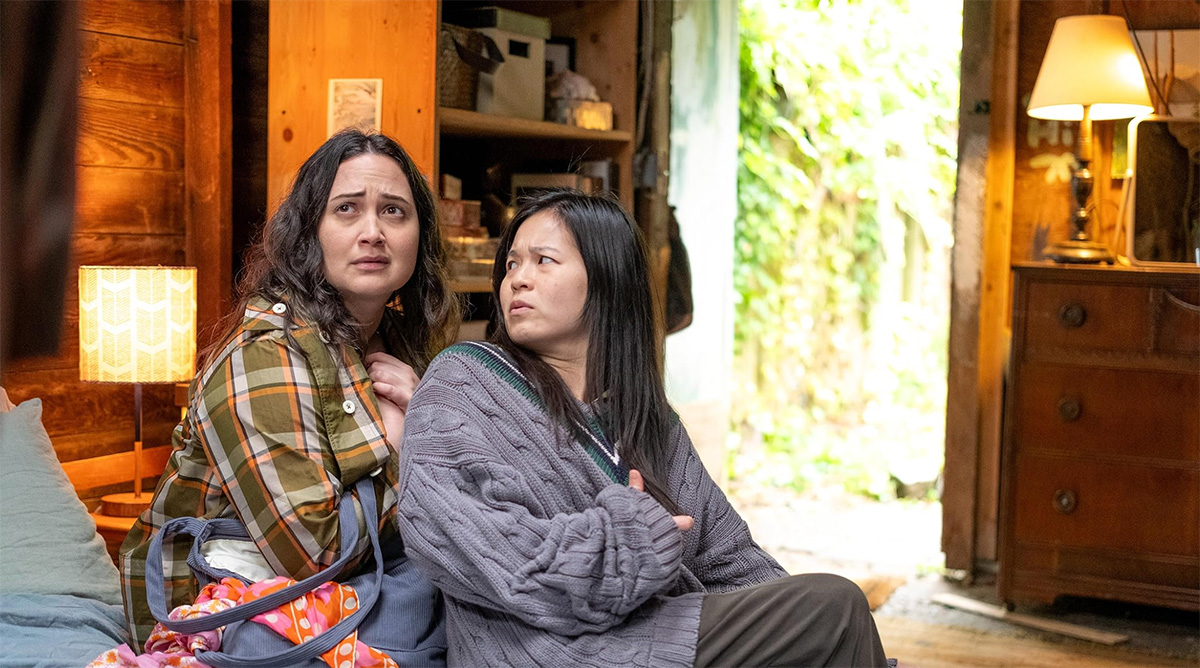
Creating a worthy remake can be a tricky proposition, especially when the movie being remade is a beloved classic – but that doesn’t mean it’s an impossible one.
Consider Andrew Ahn’s new version of 1993’s “The Wedding Banquet,” a film that put future “Brokeback Mountain” director Ang Lee on the proverbial map in America, which opens in theaters this weekend after a debut at Sundance earlier this year. The original, an American/Taiwanese production which became a surprise hit in the U.S., broke ground with its story — a culture-clash comedy of manners about a queer romantic triangle attempting to stage a sham wedding, it was quickly embraced by LGBTQ audiences thrilled to see representation on the big screen and positive representation, at that, in an era when it was even scarcer than it is today. To undertake a remake of such a film is a bold move, to say the least.
Yet gay Korean American writer/director Ahn (“Spa Night,” “Fire Island”) – has built his blossoming career on films about queer relationships among Asian American characters, with as much (or more) emphasis on family, both biological and chosen, as on romantic partnership; It seems natural, perhaps, for him to reinterpret this influential classic through his own lens, and he’s already proven himself as a filmmaker whose strengths line up perfectly with the material.
Even so, Ahn hedges his bets, perhaps, by collaborating on the new screenplay with James Schamus, who also co-wrote the original (along with Lee and Neil Peng), and the result is a movie that – although it recrafts the original romcom for a newer age and reconfigures its central relationships a bit to “up the ante” on its complications – stays relatively faithful to the broad strokes of its plot.
In this iteration, the New York setting is transposed to Seattle, and the plot revolves around not just one queer romance, but two: Chris and Min (Bowen Yang and Han Gi-Chan), a stalled grad student and his South Korean boyfriend, and their lesbian friends-and-landladies Lee and Angela (Lily Gladstone and Kelly Marie Tran), who are struggling to become parents through expensive IVF treatments. Min, an artist whose temporary visa is about to expire, wants to stay with Chris and build a life in America, but his grandmother (Youn Yuh-jung) – currently running the vast family business empire to which he is heir – wants him to come home and claim his place in the organization. A wedding to Chris would secure him the green card he needs to defy his grandmother’s demands, but it would also mean outing himself as gay and potentially being cut off from his inheritance. As a solution, he offers to pay for Lee and Angela’s fertilization procedure in exchange for a “green card wedding” with the latter, ensuring that he can remain in the U.S. while also remaining in the closet to his family.
Of course it’s an idea as bad as it sounds, but despite some reticence, the couples agree to the plan; but when grandmother decides to come to America and meet the bride in person, the four of them must attempt to pull off a masquerade that escalates far beyond their expectations after she insists on putting on a traditional – and elaborate – Korean wedding worthy of her grandson’s exalted status, all while wrestling with the ambivalence and doubts that begin to encroach on their relationships as the scheme begins to fray at the edges.
Those who’ve seen the original already know that things don’t play out exactly as planned – and anyone who hasn’t won’t be surprised when it doesn’t, anyway. We already told you it was a bad idea.
That, of course, is the charm of the romcom, a genre in which mishaps, crossed wires and conflicts are all part of the fun, and in any case it gives Ahn’s film the opportunity to explore – as Lee did with the original – the more serious and relatable challenges of reconciling our queerness with the deeply ingrained traditions of our cultural background; he does so with gentle wit and an equal measure of respect, but he’s not above getting laughs by pointing up the sheer absurdity that sometimes goes along with the process. Neither does he hesitate to delve into the messiness of queer relationships, even (and perhaps especially) with lifelong friends, or the deep insecurities and self-criticisms which get in the way of sorting them out.
To these ends, “Wedding Banquet” relies heavily on its cast, who embrace and clearly relish the chance to flesh out these characters. Yang brings his inevitable “SNL” star power to the table but downplays the wackiness in favor of a more nuanced tone, and Gi-Chan shines as his pragmatically idealistic partner; Gladstone’s intelligence and authenticity is a grounding force, while Tran counterpoints her with an eminently likable turn as her spunky-but-anxious misfit of a girlfriend – and the resonance they each bring to the prospect of motherhood highlights the longing for family and legacy that so many queer couples carry as they build their lives together.
It’s not all about the couples, though. Veteran Chinese American actress Joan Chen (“Tai Pan,” “Twin Peaks”) is a scene stealer as Angela’s hyper-supportive mom, whose participation in her daughter’s “lavender wedding” requires her to go against her deepest instincts as a proud ally, and Bobo Le provides a further connection to the theme of family with a charming performance as Yang’s tomboy-ish little sister. The anchoring performance, however, comes from acclaimed Korean star Yuh-jong, whose shrewd, savvy, and staunch portrayal of Gi-Chan’s power player grandma adds a much-needed dose of level-headed wisdom into the midst of the whirlwind.
In the end, Ahn’s update of Lee’s classic comedy scores big points for honoring the original’s message of acceptance and embracing the notion of reimagining our ideas of traditional family structures to meet the needs of an ever-changing world; it also succeeds in maintaining a heartfelt sense of empathy for each of its characters, all of whom appeal to us precisely because of their imperfections and their hangups. None of them are perfect, but all of them are perfectly human, which goes a long way toward making Ahn’s remake feel like more than just the slickly-made feel-good romcom it resembles.
And yet, given the screwball potential and the endless possibilities for farcical developments in the convoluted deception attempted by its sets of lovers, Ahn’s “Wedding Banquet” could have been funnier. Leaning into an idealized and sentimental perspective as it gracefully brings its characters’ lives into place, it occasionally feels a bit “precious,” too “Hollywood” to be believed.
Again, however, this is part of the charm of the romcom: if generations of straight audiences have gotten the chance to buy into idealized big screen fantasies about life and love, then why shouldn’t we enjoy the same privilege?
With that in mind, “The Wedding Banquet” makes for a perfect opportunity to entertain and validate ourselves – and even if it doesn’t tickle your funny bone, it’s a generous enough feast for your queer soul that it deserves you to see it.
Just make sure you bring somebody special to share your popcorn with.
-

 El Salvador3 days ago
El Salvador3 days agoGay Venezuelan makeup artist remains in El Salvador mega prison
-

 District of Columbia5 days ago
District of Columbia5 days agoReenactment of 1965 gay rights protest at White House set for April 17
-

 State Department2 days ago
State Department2 days agoHIV/AIDS activists protest at State Department, demand full PEPFAR funding restoration
-

 Opinions4 days ago
Opinions4 days agoScience must not be a weapon against trans people

